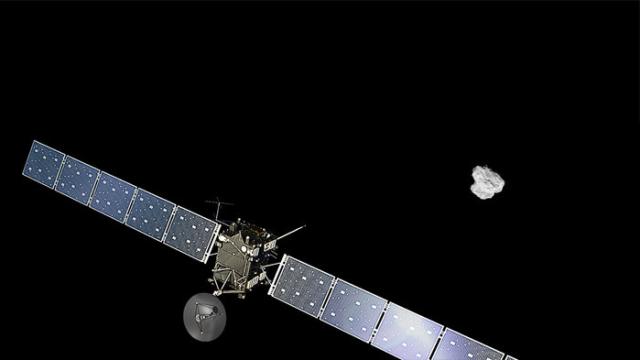While you were worrying about Philae’s landing, the spacecraft Rosetta has been patiently circling the comet, doing its own science. And it’s just dropped some intriguing results into the big debate over how Earth got its water.
In case you’re just, ahem, wading in, the origin of Earth’s water has been a great, unsolved scientific mystery. Baby Earth was a hot ball of magma, so any water on its surface would have evaporated in space. According to one leading theory, at least some of our water came from an onslaught of meteorites crashing into Earth. But did those meteorites start off as comets (balls of dust and ice that melt into a tail near the sun) or asteroids (intact pieces of rock)?
So far, the evidence seems to be tipping toward asteroids. The key clue is deuterium, an isotope of hydrogen that contains an extra neutron. Deuterium can replace hydrogen in water, and astronomers have pointing telescopes at the tails of comets to determine their deuterium-hydrogen ratios. The ratios haven’t match up with Earth’s for number of comets, but then in 2011, astronomers found Earth-like water on Hartley 2.
Rosetta’s results, however, seem to be another knock against the comet origin of water. Eric Hand reports for Science:
And ROSINA, a Rosetta instrument that uses spectrometers to measure gas abundances, has obtained a highly sought after result: the so-called deuterium-to-hydrogen ratio of water in the comet’s thin atmosphere, or coma. The measured value for 67P is much higher than the ratio in Earth’s oceans and higher than in other comets, says ROSINA principal investigator Kathrin Altwegg, of the University of Bern.
This doesn’t settle the debate once and for all, but it is yet another data point giving weight to the asteroid theory.
Finding out the comet’s deuterium-to-hydrogen ratio was a key reason for the Rosetta mission, and here we already have some preliminary data on hand. It’s also a good reminder that the Rosetta mission is far more than little, battery-dead Philae. Rosetta the spacecraft still has months to go. [Science]
Picture: ESA
